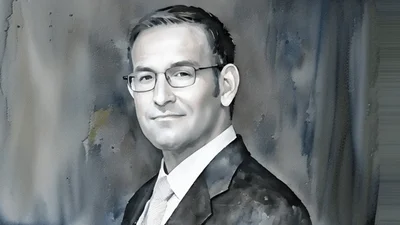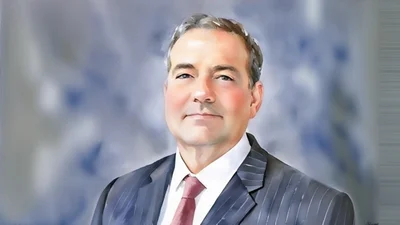John DiDonato, CEO & Founder of K12 Print | (27) John DiDonato | LinkedIn
John DiDonato’s journey as a trailblazer in American manufacturing is a story of grit, innovation, and determination. After moving to Florida with his wife in 1979 at the age of 21, DiDonato found himself at the forefront of a technological revolution — working with one of the first industrial laser shops in the United States.
“At the time, nobody really knew what lasers were,” DiDonato says. “The government had only let them out to industry maybe four or five years before I started working with them.”
His work put him in close contact with engineers from Silicon Valley and companies like Motorola, Boeing, and Hewlett-Packard. "I was making cell phone parts before there were cell phones," he says with a hint of pride.
DiDonato eventually went out on his own, purchasing his own laser machine and starting a business that would supply parts to giants like Motorola, Boeing, and NASA. “I think I probably have about 12 or 13 parts in the Hubble Space Telescope,” he says, referencing his contributions to one of NASA's most iconic projects.
From crafting delicate prototype components to tethering the tools used to repair the Hubble, DiDonato became a quiet force in American manufacturing.
The journey informs DiDonato’s strong views on the state of the American economy, where he says the need for change is urgent.
“In order to have a healthy economy, you have to have a 22% manufacturing base... We’re at 6%, and we’re going in the wrong direction,” he says. The biggest problem? “We offshored our manufacturing—basically, our manufacturing is in China now.”
His solution is to bring back hands-on training and encourage young people to pursue trades rather than funneling them exclusively into college degrees. He contrasts America’s education system with China's, where vocational training is prioritized.
“The Chinese push everybody to trade, not necessarily to college ... We don’t do anything like that.”
DiDonato points out that without practical skills, many inner-city children are left without a path to self-sufficiency.
“McDonald’s is not going to cut it,” he says. “Minimum wage is not going to cut it ... If you’re serving hamburgers, you’re in trouble.” The result is a cycle of dependency that he believes could be broken by reviving the American manufacturing sector.
To DiDonato, the value of manufacturing extends beyond economic gain. It’s about dignity, purpose, and opportunity. “How valuable is it for someone to go to work every day and have something to do?” he asks. “You can’t underestimate how valuable that is.”
He also calls for a shift in how Americans think about tariffs and production costs. While critics argue that manufacturing goods domestically increases prices, DiDonato frames it differently.
“Suppose we paid another $100 for the television,” he says, “but we weren’t being taxed on the other side for people to not be as productive as they could be.”
The higher upfront cost, he argues, could be offset by reducing reliance on government-funded social programs like welfare and food stamps.
This perspective fuels his larger mission: bringing manufacturing jobs back to the U.S. "If we can start making things here again, the economy will be stronger, our people will have jobs, and our communities will be better off," he says.
DiDonato doesn’t mince words when discussing China's role in the global economy. He sees the U.S. reliance on Chinese manufacturing as a threat to our economic and national security. "We’re giving our economic rival and potential military rival special economic status,” he says. “Meanwhile, the Chinese are building more nukes, more military, and more navy.”
He points to China's strategic influence in South America as an example of their long-term thinking. "They’re building bridges and infrastructure, and they’re building people into submission,” he says, referencing China's foreign investments that often come with strings attached.
At the same time, DiDonato recognizes the humanity of the Chinese people. “These are just hardworking people,” he says. His preferred path forward is one of peaceful competition rather than conflict.
"[Our] people talking with their people is not a bad thing, because the alternative is something that we can’t even think about," he says.
When asked about China's potential to invest in U.S. factories, his answer is practical, though not without caution. “They want to build a factory here and help us teach our children how to make things,” he says. “How can that be bad?”
His logic is that foreign direct investment in American communities could reduce the risk of conflict and create opportunities for Americans to learn new skills.
DiDonato isn’t just talking about change — he’s making change happen in his own business. As the founder of K12 Print, he put his factory in an Opportunity Zone, a government-designated area designed to attract investment to economically distressed communities.
“We put young inner-city people to work,” he says. “I want to tell you something — it’s like their lives are going 100 miles an hour because they’re trying to figure [things] out … They come to work, and it’s like their life slows down to about 20 miles an hour.”
His company’s mission is about more than profits — it's also about transforming lives.
"Imagine what we could do in that community," he says. “It would be unbelievable. People could be put to work, mothers and fathers could support their children. We have children that have never been loved. No one’s ever loved them. How do you grow up like that if no one’s ever really cared for you?”
DiDonato believes America’s manufacturing decline coincides with a decline in moral accountability. “It went wrong when we took God out of the classroom,” he says. "We didn’t teach our children that there’s somebody more important than us, that the world doesn’t revolve around you.” He argues that this shift in perspective has created a generation unmoored from responsibility and purpose.
This lack of accountability extends to the nation's leadership. “We have too many lawyers running the country and not enough tradesmen,” he says. "They want to sit there and go back and forth and fight with each other. Meanwhile, our children suffer in inner cities, and it did nothing for them."
DiDonato points to the stark reality of homelessness in Palm Beach County, Florida, where 9,600 children live in cars, vans, and other unstable housing situations. “Their parents are deathly afraid of losing them to the system,” he says. Without proper community support or stable employment, many of these families remain on the brink.
Despite the challenges, DiDonato remains optimistic. “I hope [Donald Trump] can set America on a different path,” he says, though he acknowledges that Trump’s first term didn’t achieve all that was needed. “I don’t think he did a lot of it, because it wasn’t right in their face like it is now.” The urgency, he believes, is clearer today.
For DiDonato, hope lies in action. By building a business that puts people to work, advocating for the return of domestic manufacturing, and encouraging a culture of accountability, he believes a stronger America is possible. “We have to start making things. We have to have that part of our economy back,” he says.
You can listen to the entire interview at the following link:








